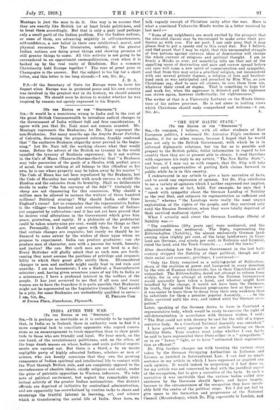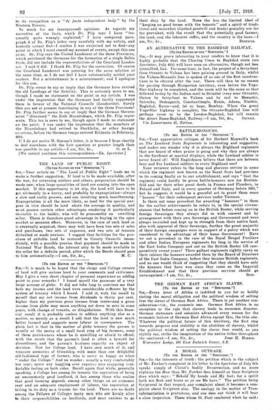" THE NEW BALTIC STATE."
[To no EDITOR OW THE " SPEOTATOR."3 SIR,—In common, I believe, with all other students of East European politics, I welcomed Dr. Antonius nip's residence in London, if for no other reason, because I hoped that he would give not only to the British Government, with which he is in informal diplomatic relations, but (so far as is possible and proper) to the British public, fuller information in regard to his country than they are at present able to obtain. I read therefore with eagerness his reply to my article, " The New Baltic State"; and hope, if I may say so with respect, that Dr. Piip will take further such opportunities of putting Esth claims forward in public while he is in this oountry.
I endeavoured in my article to give a bare narrative of facts, and to avoid any expression of opinion. Yet Dr. Piip attributes to me a variety of opinions which I neither expressed nor implied, nor, as a matter of fact, hold. For example, he says that I "speak with sympathy about the German Landtag of Nobility as the real Diet, and estimate its representation as sufficient and heroic," whereas "the Landtags were really the most unjust exploitation of the rights of the people, and they survived only until the Russian Revolution, when they were totally deprived of their survived mediaeval rights."
What I actually said about the German Landings (Diets) of Nobility was :—
" The conditions [fifty years ago] were mediaeval, and the administration was mediaeval. The Diets, representing the Bitterschaften [Nobility], the almost exclusively German land- owning class (eighty per cent, of the large landowners in Cour- land are German, and ninety per cent. in Esthonia and Livonia), ruled the land, and the Town Councils. . . ruled the towns."
After describing how the Russian Government in the last half- century stripped the Nobility of their political, though not of their social and economic, privileges, I continued :—
"Only the Diets remained as a rallying-point of Baltentuni,
shorn of the realities of power and hampered in every direction by the veto of Russian tchinovniki, but in their Constitution still untouched. The Bitterschaf ten dared not attempt to reform froin within, for in any attempt at reform the Russian bureaucracy would assuredly have taken a hand, and whoever might have benefited by the change, it would not have been the Germans. In truth, they suited the Russian programme best as they were : it was easier to leave them to decay from their own weakness than to substitute for them a genuine popular Assembly. . . . So the Diets survived until the war, and indeed until the German occu- pation." Later, speaking of the German desire to have in Courland a representative body, which would be ready to exercise the right of self-determination in accordance with German wishes, I said : " The Diet could not with decency be cast for the role of a repro- sentative body. So a Courland National Assembly was convoked."
I have quoted every passage in my article bearing on these Nobility Diets. Your readers must judge whether I can fairly be said to have represented these Diets either in a " sympathetic " or in an " heroic " light, or to have "estimated their representa- tion as efficient."
Dr. Piip further charges me with treating the various steps taken by the German Occupying Authorities in Esthonia and Livonia as justified in International Law. I can find no single sentence in my article in which I have expressed or implied any such opinion. It would indeed be surprising if I had done so, for my article was not concerned to deal with the juridical aspect of the occupation, but to give a narrative of the facts. In such a narrative it was inevitable that the various bodies called into existence by the Germans should figure, and figure largely, because in the circumstances of the occupation they have inevit- ably held the centre of the political stage. Yet I did not fail to give space to the formation and programme of the National Council (Maanoukogu), which Dr. Piip represcnts in London. and to its recognition as a "de facto independent body" by the Western Powers.
So much for my (unexpressed) opinions. As regards my narrative of the facts, which Dr. Piip says I have "fre- quently quite wrongly explained," I have compared para- graph 4 of Dr. Piip's letter very carefully with my article, and honestly cannot find—I confess I was surprised not to find—any point in which I must emend my account of events, except this one point. Dr. Piip says the United Landesrat of the three Provinces, which petitioned the Germans for the formation of a single Baltic State, did not include the representatives of the Courland Landes- rat. I said it did. I thank Dr. Piip for the correction. Of course the Courland Landesrat was pressing for the same solution at the same time, so I do not feel I have substantially misled your readers. But a misstatement is a misstatement; and I apologize for this one.
Dr. Piip seems to say or imply that the Germans have revived the old Landtags of the Nobility. This is certainly news to me, though I made no statement on the point in my article. I was under the impression that the Germans had tacitly suppressed them in favour of the National Councils (Landesriite). Surely they are not at present functioning in any of the three Provinces? Dr. Piip further seems to say or imply that the German Govern- ment " dismissed " the Esth Maanflukogu, which Dr. Piip repre- sents. This too is news to me, though again I made no statement en the point. I was under the impression that the members of the Maanoukogu had retired to Stockholm, or other foreign countries, before the German troops entered Esthonia in February, 1918.
If I do not notice M. Simson's letter, it is because I hope shortly to deal elsewhere with the Lett question at greater length than



































 Previous page
Previous page